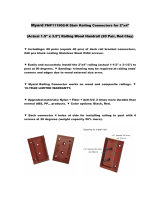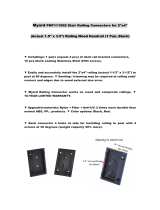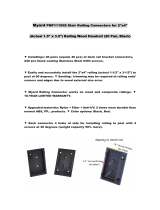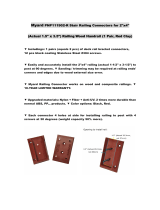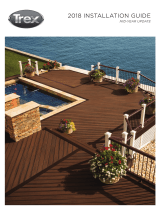Page is loading ...

Step 8: Clamp the top and bottom rails
together with the top 2x4 rail invert-
ed. Position rails as shown and mark
5-1/2"on-center, working from the
center out to the ends of the rails.
Step 9: Properly position the connectors
on the rails. The top and bottom
connectors will be facing opposite
directions. Screw the connectors
in place. To properly set angled
connectors, begin screwing ver-
tically until the screw bites into
the wood. Reposition screw to the
proper angle and tighten. Do not
over-tighten, which can move the
connector off center.
Step 10: Make sure connectors are properly
aligned, apply silicone caulk to
each stair connector, and assem-
ble the top and bottom rails with
the balusters. Then attach full
rail section between the stair rail
posts.
Step 4: Place the bottom rail between
the rail posts, supported by a 3"
block (2x4 scrap material works
best). Secure rail to posts using
Deckorators rail connectors (sold
separately) and slide balusters over
the bottom connectors. Carefully
place top rail over the balusters,
making sure each baluster is seat-
ed properly on each connector.
Step 5: Inspect finished railing for proper
baluster spacing and secure top
rail. Add a cap rail for a finished
look.
Step 6: For rail sections longer than 4’,
support blocks are recommended.
These can be made from leftover
2x4 rail material. Properly position
the support block and toe-nail it
to the bottom rail and deck board.
Stair Railing
Step 7: Stair rails and balusters can pres-
ent an installation challenge.
Deckorators angled stair rail con-
nectors (sold separately) create a
snug and accurate baluster fit for
stair angles ranging from 30 to 35
degrees. Cut top and bottom stair
rails at the proper angle. Lay top
and bottom 2x4 rails alongside the
posts and mark.
Prior to construction, check with your local
regulatory agency for special code require-
ments in your area. Common railing height
is 36". Structural support should come from
either the continuation of deck support
posts that extend up through the deck
floor or from railing posts that are bolted
to the inside of the rim or outer joist. 6'
on-center post spacing is recommended.
Never span more than 8' on-center between
railing posts.
In-Line railing
Step 1: Measure railing opening from post
to post to determine the length of
each baluster rail section.
Step 2: Cut top and bottom rails (2x4s) to
length and clamp together. Mark
top and bottom rails 4-1/2" on-cen-
ter, starting from the center of
the rail.
Step 3: Using a drill driver, screw on
Deckorators baluster connectors
(sold separately) on each mark
using the screws provided. Apply
silicone caulk on each connector
to prevent balusters from turning
or rattling after installation is com-
plete. The caulk should be on the
outside of the connector, where
the baluster will make contact with
the connector’s outer edge.
Note: Specific types of treated lumber are
known to corrode aluminum. Deckorators
baluster connectors provide a barrier
between the aluminum balusters and treat-
ed lumber to ensure long term performance.
Kit Contents:
• 10 - Aluminum balusters
(2.5 balusters required
per linear foot of railing)
Items You Will Need:
• Deckorators baluster connectors
(sold separately)
• Deckorators stair connectors
(sold separately)
• Deckorators rail connectors
(optional, sold separately)
• Drill driver
• Tape measure
• Clamps
• Safety glasses
• Carpenter’s pencil
• White rubber mallet
• Support blocks (can be cut
from scrap rail material)
The diagrams and instructions in this brochure are for
illustration purposes only and are not meant to replace
a licensed professional. Any construction or use of the
product must be in accordance with all local zoning and/or
building codes. The consumer assumes all risks and liabili-
ty associated with the construction or use of this product.
The consumer or contractor should take all necessary
steps to ensure the safety of everyone involved in the
project, including, but not limited to, wearing the appro-
priate safety equipment. EXCEPT AS CONTAINED IN THE
WRITTEN LIMITED WARRANTY, THE WARRANTOR DOES
NOT PROVIDE ANY OTHER WARRANTY, EITHER EXPRESS
OR IMPLIED, AND SHALL NOT BE LIABLE FOR ANY DAM-
AGES, INCLUDING CONSEQUENTIAL DAMAGES.
CLASSIC BALUSTERS INSTALLATION INSTRUCTIONS
/
